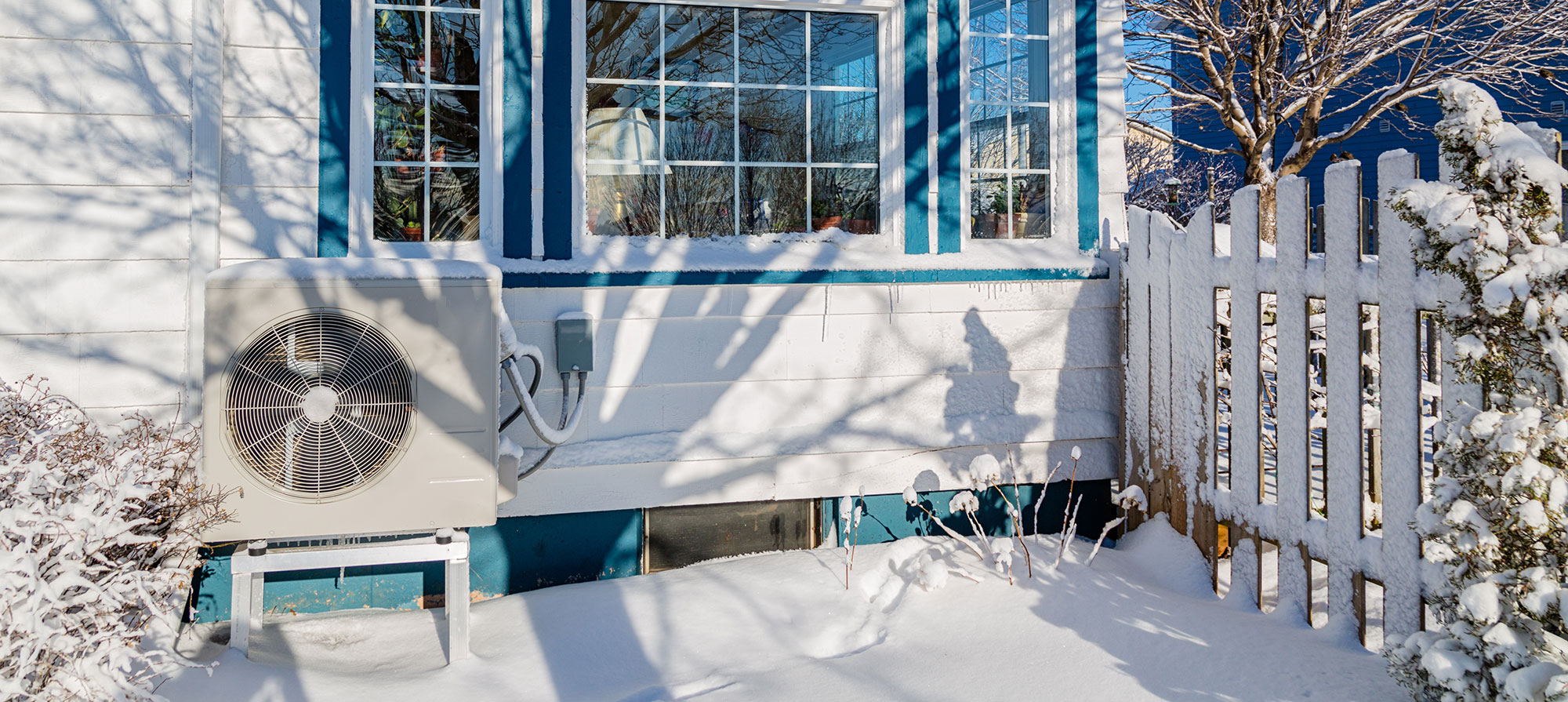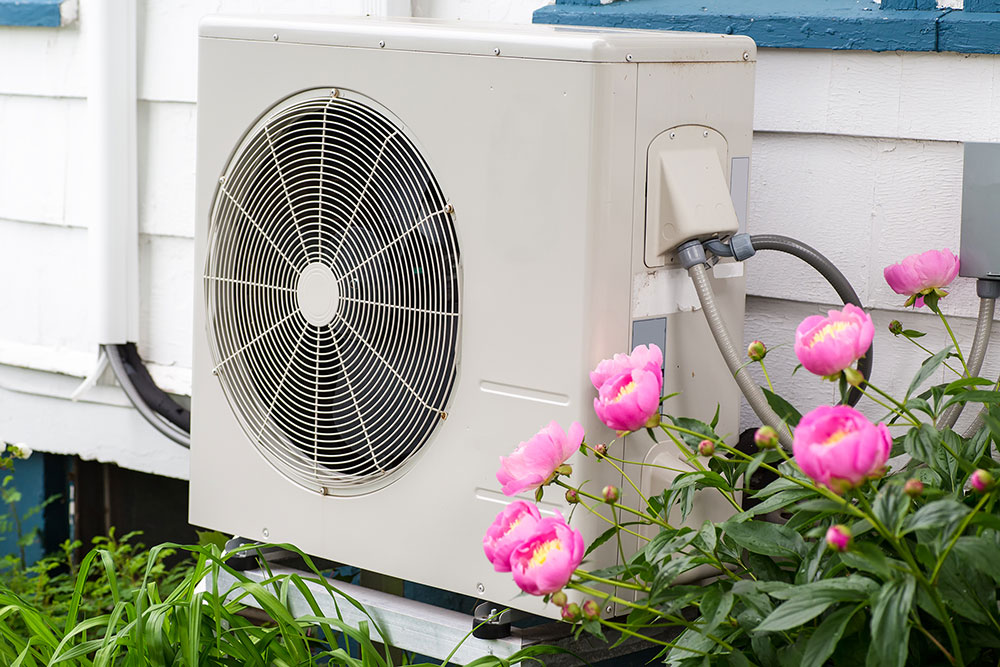
Heat Pumps
Heat pumps are an energy-efficient alternative to furnaces, boilers and air conditioners for all climates. Rather than generating warm air for your home by burning fuel, heat pumps transfer heat from one space to another. For example, during heating season, heat pumps move heat into your home. In the summer, the opposite occurs—heat pumps remove warm air from your home and move it outdoors.
It's important to make sure your home is well insulated and airtight prior to installing a heat pump. This will decrease your heating and cooling needs, making the heat pump’s job easier. Heat pumps are most economical for homes that are heated with an electric furnace or baseboard heater, propane, wood or fuel oil. Heat pumps also can be paired with natural gas furnaces for a “dual-fuel” heating approach.
Heat naturally moves from hotter to colder spaces. This movement of heat is the result of a refrigeration cycle, which creates the ability to move or “pump” heat from one space to another, much like a standard air conditioner. Heat pumps allow the direction of the refrigerant to be reversed, enabling them to heat your home as well.

Types of heat pumps
- Air-source heat pumps: An air-source heat pump heats or cools a home by transferring heat to and from the air through refrigerants in copper tubing. The tubing integrates with an indoor unit and connects to ductwork that distributes the heated or cooled air throughout the house. There also are ductless versions available consisting of an outdoor compressor that connects to smaller indoor units that are sometimes referred to as heads, cassette heads, ceiling- or wall-mounted.
- Geothermal, or ground-source, heat pumps: A geothermal, or ground-source, heat pump heats or cools your home by moving heat to and from the ground through a series of buried loops. A "desuperheater" can be added to a geothermal heat pump to provide water heating.
Dual-fuel heating is an approach where you have a natural gas or LP furnace and a heat pump that work together. The furnace is there for the heavy lifting of the coldest months, while the heat pump can heat during the shoulder months (think spring and fall). This can give you the opportunity to use each system optimally based on costs and environmental benefits. It also provides peace of mind if one system were to fail.
Remember, heat pumps move heat from one location to another, and in winter in colder climates, it becomes harder to move heat from the outside to the inside. In those cases, the overall efficiency of the heat pump will drop, so a dual-fuel system can be a winning combination. Heat pumps are very efficient at cooling, so they are a natural choice when it comes to cooling your home.
Heat pump benefits
A key benefit is that heat pumps can be used for both heating and cooling purposes, potentially reducing the need for two different types of equipment. They typically have a lifespan of around 15 years. In addition, heat pumps:
- Are more efficient because they move heat rather than generate it.
- Give you flexibility and peace of mind to heat with electricity and/or natural gas when paired with a natural gas furnace, often referred to as a dual-fuel approach.
- Can provide a more consistent heating and cooling experience, leading to increased comfort.
- Can help reduce your carbon footprint over the life of the equipment.
Consider a heat pump if you are:
- Thinking about adding or replacing your central air-conditioning.
- Planning for the replacement of your heating system.
- Renovating or adding on to an existing house where it may be difficult to add ductwork.
- Building a new house.
Before you buy
- Make sure your home is well insulated and air sealed with good ventilation regardless of the type of heating system you choose.
- For ground-source heat pumps, contact the Wisconsin Geothermal Association for a list of experienced professionals.
- For air-source heat pumps, it's recommended to find a contractor through Focus on Energy's IRA Registered Contractor list to ensure that your installation is eligible for both Focus on Energy and federal rebates.
- Review Focus on Energy's Electric Heat Pump Customer Buying and Operation Guide.
- Under the Inflation Reduction Act (IRA):
- Federal tax credits are available for qualified heat pumps. Visit energystar.gov to learn more.
- Federal rebates are available for income-qualified households that purchase and install a qualified heat pump through the Home Electrification and Appliance Rebate (HEAR) program.
- The U.S. Department of Energy offers the Tax Credit Product Lookup Tool to help determine if an appliance is eligible for a Federal Energy Efficiency Home Improvement tax credit.
- Focus on Energy is offering rebates for purchasing and installing qualified heat pumps. Visit focusonenergy.com to learn more.
Frequently Asked Questions
Ducted heat pumps use your existing ductwork to deliver heated and cooled air.
Ductless heat pumps or “mini-splits” use a combination of inside units to deliver heated or cooled air.
Examples include wall- or floor-mounted units, recessed in-ceiling cassettes or suspended ceiling units.
As long as your house is properly air sealed and insulated, a cold-climate heat pump can perform well beyond temperatures of -13°F. Some newer models can even handle temperatures as low as -22°F.
The carbon footprint of operating a heat pump depends on the sources of electricity your utility company uses.
MGE already has reduced carbon emissions associated with meeting our customers' electricity needs by about 40% (since 2005). We are working toward carbon reductions of at least 80% by 2030 and net-zero carbon electricity by 2050. As MGE continues to increase its use of renewable energy sources and decarbonizes its energy supply mix, our carbon footprint from electric generation will decrease, as will the footprint of operating a heat pump.
Heat pumps vary in cost depending on capacity/size and efficiency.
Cold-climate heat pumps tend to cost more than those used in warmer regions because they incorporate more advanced technology to work in colder temperatures.
Cost also is impacted by the type of heat pump (ducted versus non-ducted) and other options, such as whether it is paired with a natural gas furnace (a dual-fuel approach).
Cold-climate heat pumps may, on average, cost more than a traditional natural gas and air-conditioning system; however, state and federal incentives and tax credits may make a heat pump option more comparable to the cost of traditional systems.
Visit Focus on Energy, MGE's partner in energy efficiency, for an Electric Heat Pump Customer Buying and Operation Guide for single-family homes to explore options.
Prior to installing a heat pump, it's good practice to have an assessment of your home's insulation and air sealing. An assessment helps to ensure your heat pump will operate as efficiently as possible.
Focus on Energy offers a list of trade allies you can hire to perform an energy assessment to help identify which upgrades make the most sense for your home. For federal rebates, you must use an IRA-certified contractor/auditor. For Focus on Energy rebates, use this trade ally finder.
Typically, homes with an existing air conditioner do not need an upgraded electrical panel to add a heat pump; however, if you're also considering a heat pump water heater, a heat pump dryer, an induction cooktop or an electric vehicle charger, you may need to add more amperage.
Through the Home Electrification and Appliance Rebates (HEAR) program, income-qualified households can receive an instant rebate on an electrical panel upgrade and electrical wiring.
Now through 2032, a tax credit of 30% (or up to $600) is available for a 200-amp electric panel upgrade that is being installed in conjunction with and enables the installation and use of:
- Any qualified energy efficiency improvements or
- A qualified energy property (including a heat pump water heater, heat pump, central air conditioner, water heater, furnace or hot water boiler, biomass stove or boiler).
Heat pumps need to meet criteria set by the Department of Energy and Focus on Energy to receive tax credits and rebates. The requirements for a federal tax credit are different from the requirements for Focus on Energy rebates.
To learn about heat pump requirements for Focus on Energy programs, as well as Focus on Energy rebates and discounts, visit focusonenergy.com.
To learn about heat pump requirements for the IRS tax credits, visit energystar.gov.
Visit energystar.gov for a list of energy efficiency ratings definitions.

